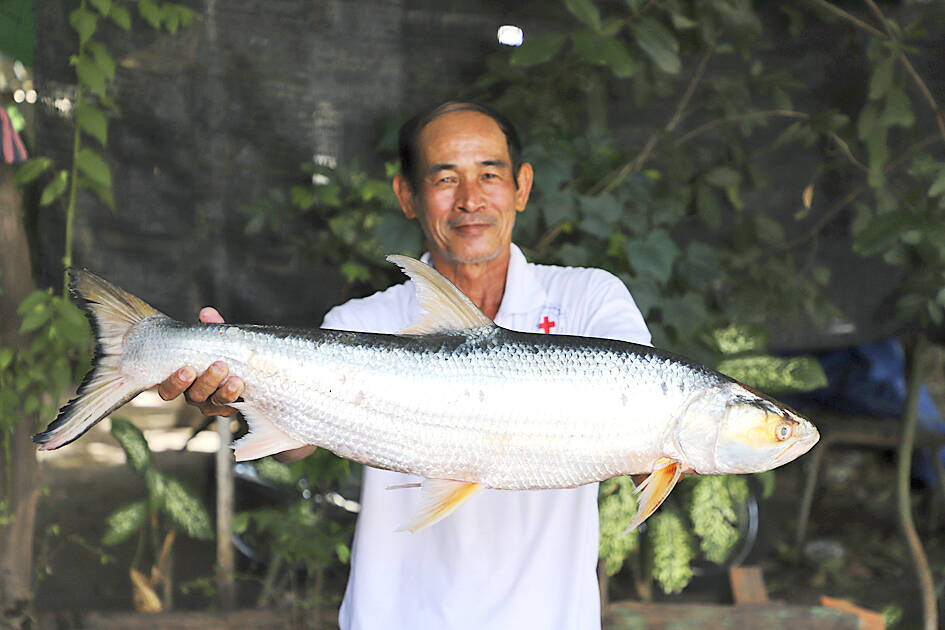A huge fish in the Mekong River thought to be extinct has been spotted three times in recent years.
“The giant salmon carp is like a symbol of the Mekong region,” said Chheana Chhut, a researcher at the Inland Fisheries Research and Development Institute in Phnom Penh.
The predatory fish can grow up to 1.2m in length and has a conspicuous knob at the tip of its lower jaw. A striking patch of yellow surrounds its large eyes.

Photo: AP
With the last confirmed sighting in 2005, “this species of fish seems to have disappeared from the Mekong region for decades,” said Chheana, who is a coauthor of a study published online on Monday in the journal Biological Conservation that documents the recent sightings.
Since 2017, biologists tracking migratory fish species in Cambodia have developed relationships with local fishing communities, asking them to alert any unusual sightings.
That is how the three giant salmon carp found in the Mekong River and a tributary in Cambodia from 2020 to last year came to the attention of researchers.
“I was really surprised and excited to see the real fish for the first time,” said Bunyeth Chan, a study coauthor and researcher at Svay Rieng University in Cambodia.
Researchers say the sightings give them new hope for the fate of the species.
One nickname for the species is “ghost fish.”
“This rediscovery is very exciting, positive news,” said Zeb Hogan, a fish biologist at the University of Nevada, Reno, who was part of the team.
However, the plight of the fish also spotlights the perils facing all migratory species in the Mekong, which faces industrial pollution and overfishing.
More than 700 dams are built along the river and its tributaries, and there are very few functional “fish passages” to help species navigate obstructions, Stimson Center Southeast Asia Program director Brian Eyler said.
The biologists said they hope that working with local communities in Thailand and Laos would enable them to confirm if the fish still swims in other stretches of the Mekong River.

ECONOMIC WORRIES: The ruling PAP faces voters amid concerns that the city-state faces the possibility of a recession and job losses amid Washington’s tariffs Singapore yesterday finalized contestants for its general election on Saturday next week, with the ruling People’s Action Party (PAP) fielding 32 new candidates in the biggest refresh of the party that has ruled the city-state since independence in 1965. The move follows a pledge by Singaporean Prime Minister Lawrence Wong (黃循財), who took office last year and assumed the PAP leadership, to “bring in new blood, new ideas and new energy” to steer the country of 6 million people. His latest shake-up beats that of predecessors Lee Hsien Loong (李顯龍) and Goh Chok Tong (吳作棟), who replaced 24 and 11 politicians respectively

Archeologists in Peru on Thursday said they found the 5,000-year-old remains of a noblewoman at the sacred city of Caral, revealing the important role played by women in the oldest center of civilization in the Americas. “What has been discovered corresponds to a woman who apparently had elevated status, an elite woman,” archeologist David Palomino said. The mummy was found in Aspero, a sacred site within the city of Caral that was a garbage dump for more than 30 years until becoming an archeological site in the 1990s. Palomino said the carefully preserved remains, dating to 3,000BC, contained skin, part of the

Russian hackers last year targeted a Dutch public facility in the first such an attack on the lowlands country’s infrastructure, its military intelligence services said on Monday. The Netherlands remained an “interesting target country” for Moscow due to its ongoing support for Ukraine, its Hague-based international organizations, high-tech industries and harbors such as Rotterdam, the Dutch Military Intelligence and Security Service (MIVD) said in its yearly report. Last year, the MIVD “saw a Russian hacker group carry out a cyberattack against the digital control system of a public facility in the Netherlands,” MIVD Director Vice Admiral Peter Reesink said in the 52-page

‘WATER WARFARE’: A Pakistani official called India’s suspension of a 65-year-old treaty on the sharing of waters from the Indus River ‘a cowardly, illegal move’ Pakistan yesterday canceled visas for Indian nationals, closed its airspace for all Indian-owned or operated airlines, and suspended all trade with India, including to and from any third country. The retaliatory measures follow India’s decision to suspend visas for Pakistani nationals in the aftermath of a deadly attack by shooters in Kashmir that killed 26 people, mostly tourists. The rare attack on civilians shocked and outraged India and prompted calls for action against their country’s archenemy, Pakistan. New Delhi did not publicly produce evidence connecting the attack to its neighbor, but said it had “cross-border” links to Pakistan. Pakistan denied any connection to